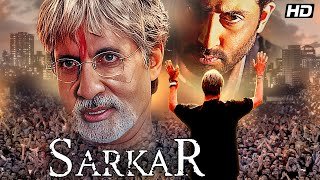Introduction:
Sarkar, directed by Ram Gopal Varma, is not merely a gangster film or a political thriller—it is a modern myth steeped in the complexities of power, morality, and legacy. Loosely inspired by The Godfather, the film is deeply rooted in Indian socio-political reality, particularly the emotional and ethical structure of Indian families, the perception of justice in an imperfect system, and the cultural sanctity given to figures who command authority by virtue, not legality.
This analysis will peel away the film’s layers—not just plot and character—but tone, ideology, cinematic language, symbolic layering, and the deeply embedded father-son dialectic that defines the emotional heart of the story.
Plot Overview: The Rise of a Shadow Monarch
Subhash Nagre, known as Sarkar (played with titanic gravitas by Amitabh Bachchan), is a man revered and feared in equal measure. Though not holding any official political position, Sarkar commands massive influence over the people, dispensing justice where the state fails. He is not a criminal in the conventional sense; he is a parallel system—both judge and executioner, father figure and enforcer.
His two sons—Vishnu (Kay Kay Menon), the volatile and morally weak elder, and Shankar (Abhishek Bachchan), the idealistic and disciplined younger one—form the emotional axis around him. The story is set into motion when Sarkar is falsely accused of attempting to assassinate a prominent politician. As his enemies close in and betrayals mount, it is Shankar who rises from the shadows, not just to defend his father, but to inherit and eventually reshape his legacy.
Subhash Nagre / Sarkar: The Mythical Lawgiver
Sarkar is less a man and more a symbol—a moral deity who operates outside the written law but within an unwritten moral code. His character blurs the lines between dharma and crime, legality and righteousness. He is essentially a modern-day embodiment of Maryada Purushottam Ram (ideal man), but one who is willing to stain his hands to uphold societal balance.
Visual Representation:
Sarkar is mostly filmed in low light, his figure often emerging from shadow, symbolizing his presence as the power behind the visible world. His shawl, his seated posture, his minimal speech—all reinforce the image of a calm yet omnipotent patriarch. The camera often looks up at him, increasing his mythic stature.
Moral Ambiguity:
Unlike stereotypical dons, Sarkar is not driven by greed or personal vendetta. He is instead portrayed as a custodian of justice—one that the corrupt political system has failed to provide. His decisions are harsh, but the film never questions their necessity. This moral lens transforms him from a gangster into a philosopher-king—a ruler without a throne.
Shankar Nagre: The Birth of a New Sarkar
Shankar’s character arc is the most significant and tragic within the film. He begins as a clean-slate youth returning from the United States—educated, pragmatic, and removed from the shadows of his father’s world. Yet, his transformation into the new Sarkar is inevitable and mercilessly orchestrated.
Conflict of Ideals:
Shankar is initially skeptical of Sarkar’s vigilante justice. But when his father is attacked and his family torn apart, his moral compass recalibrates. He does not become his father’s puppet; he becomes the next evolution of Sarkar—a blend of traditional authority and modern strategy.
The Final Transcendence:
The last scene, where Shankar sits in Sarkar’s chair, being petitioned by followers, while Subhash retreats into the background, is not just a power shift—it is a symbolic generational handover. The transformation is complete. He is no longer just a son avenging a father; he is the new axis of power.
Vishnu Nagre: The Tragedy of Weakness
If Shankar is the rising sun, Vishnu is the eclipse—the son who could not rise to the occasion. Vishnu is impulsive, driven by personal ambition and selfish desires, particularly visible in his affair with an actress. His inability to control emotion and his betrayal of family make him the embodiment of political fragility.
Father-Son Dichotomy:
Vishnu’s failure is not just personal, it’s symbolic. His arc reflects what happens when power is claimed without character. His demise is not shown with bombast but with solemn finality—a necessary cleansing to preserve the purity of the throne.
Themes Explored
1. Power Without Position
One of the most profound statements Sarkar makes is that real power does not lie in elected positions but in influence—cultural, emotional, and psychological. Sarkar does not need to run for office. His presence, his judgments, and his philosophy of justice command greater loyalty than the state.
2. Justice vs. Law
The entire film questions the legitimacy of legal institutions. Sarkar’s vigilante justice is positioned not as rebellion, but as correction. The law is shown as easily corrupted, blind to real issues, and toothless in the face of political rot. In such a vacuum, someone like Sarkar becomes necessary, even revered.
3. The Burden of Legacy
The film deeply engages with the weight of inheritance—not just property or name, but ideology. Shankar inherits not just his father’s followers, but his enemies, his responsibilities, and the moral labyrinth that comes with power. The act of inheritance here is spiritual and sacrificial. It’s not a throne—it’s a pyre.
4. Betrayal and Loyalty
Loyalty in Sarkar is earned not through fear, but through respect. Conversely, betrayal is not just political—it is personal. The betrayal by Vishnu, the external enemies in the political landscape, and even the hidden threats within Sarkar’s trusted circle all serve as metaphors for the fragility of empires built on personal allegiance.
Cinematic Language and Symbolism
Use of Silence:
Dialogues are sparse, but silence is heavy. Ram Gopal Varma uses silence not as absence but as presence. Each pause between words, each withheld glance, adds weight to the scenes.
Color and Lighting:
The color palette is steeped in shades of black, brown, and saffron—colors that evoke earth, decay, and traditional authority. Lighting is often sourced from single lamps, creating chiaroscuro effects—splitting faces between shadow and light, suggesting duality.
Soundtrack:
The haunting chant of “Govinda Govinda” acts as both background score and spiritual commentary. It evokes not joy but reverence and dread—transforming the film from crime drama to moral epic.
Sarkar vs. The System:
Sarkar is an outsider within the system. The political figures in the film wear white kurtas and speak of democracy, but it is Sarkar, dressed in black, who commands genuine respect. He becomes an anti-heroic contrast to the sterile, impotent bureaucracy.
This battle is not of bullets alone—it’s ideological. Sarkar’s justice is immediate and felt. The government’s justice is procedural and postponed. The audience is led to root for the outlaw, because the law is shown as broken.
Women in Sarkar: Silent Pillars
Though women have minimal screen time, their presence is foundational. Sarkar’s wife represents silent strength—a moral compass even if not involved in power games. Shankar’s girlfriend symbolizes the life he must abandon to accept his fate.
Women here are not active agents of the narrative, but they are vital symbols of the personal sacrifices made in the pursuit of legacy.
The Title: A Loaded Word
The word Sarkar itself is multilayered. In Urdu and Hindi, it translates to “government,” but also connotes lordship or divine authority. The title plays on this duality. Is Sarkar the man or the system? Is he the protector or the tyrant? The film never gives a definitive answer—because power, once personalized, is always both.
Conclusion: A Fable of Blood and Belief
Sarkar is not just a film about politics or crime—it’s a meditation on what happens when moral authority exists outside legal structures. It asks whether such authority is dangerous or necessary, and what it costs to carry such weight. It is Shakespearean in its emotional scale, mythological in its symbolic frame, and ruthlessly Indian in its cultural essence.
At its core, Sarkar is a study of succession, sacrifice, and sovereignty. It is the story of a man who becomes a legend, and a son who must give up his life to carry forward the name—not for the sake of power, but for the idea that justice, however flawed, must never die.
Would you like a similar in-depth analysis of its sequels, Sarkar Raj or Sarkar 3?

